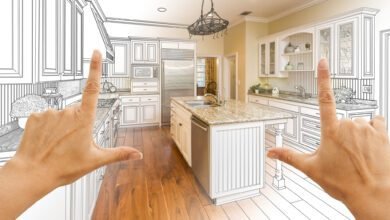Home additions are a great way to expand your living space and increase the functionality and value of your home. Whether you need more bedrooms, a larger kitchen, a home office, or additional living areas, a home addition can be a viable solution.
In this article
Types of Home Additions:
You can make home additions according to your requirements and plans. Here are some common types of home additions:
Room Addition:
This involves adding an entirely new room to your existing home. It could be a bedroom, bathroom, home office, family room, or other living space. Room additions can be built outwards, upwards (as a second-story addition), or as an extension to an existing structure.
Sunroom:
A sunroom is a popular addition that allows you to enjoy the outdoors while being protected from the elements. It typically features large windows and may be used as a sitting area, a greenhouse, or a relaxation space.
Bump-Out Addition:
A bump-out addition is an option if you need a little extra space but want to avoid undertaking a major construction project. It involves expanding an existing room, such as a kitchen or bathroom, by pushing out one of the walls to create a small extension.
Basement or Attic Conversion:
You can convert these areas into usable living spaces if you have an unfinished basement or attic. This can provide additional bedrooms, a home theatre, a game room, or a guest suite.
Garage Conversion:
If you have an attached or detached garage, you don’t use to park your vehicle; you can convert it into a livable space. This is an excellent option for creating a home office, a playroom, a gym, or an additional bedroom.
Benefits of Home Additions:
Home additions offer several benefits that can enhance your living experience and add value to your property. Here are some of the key advantages:
Enhanced Functionality:
Home additions can improve the functionality of your home by addressing specific requirements. For example, adding a home office can provide a dedicated workspace, increasing productivity and separating work from the rest of the house. A new bathroom can alleviate congestion and make your morning routine more efficient. By expanding and optimizing your living spaces, you can make your home more convenient and enjoyable to live in.
Increased Property Value:
Well-executed home additions have the potential to increase the value of your property. When you add square footage and improve the functionality of your home, it becomes more desirable to potential buyers. This can translate into a higher resale value when you sell your property. However, it’s essential to consider local real estate trends and ensure that your addition aligns with the preferences and needs of your target market.
Increased Living Space:
The most obvious benefit of a home addition is adding additional living space. Whether you need extra bedrooms, a larger kitchen, a home office, or more recreational areas, an addition can fulfill those needs. It allows you to customize your home to suit your lifestyle and accommodate your family’s changing needs.
Personalization and Customization:
Home additions allow you to personalize and customize your living environment. You can create spaces that reflect your taste, preferences, and lifestyle. From choosing the layout and finishes to incorporating specific features and amenities, you can make your home uniquely yours.
Avoiding Construction Costs:
Adding to your existing home may be more cost-effective than building a new one from scratch. Home additions can be more affordable than purchasing a larger home or constructing a new property. You can save on certain construction costs by leveraging your current foundation and infrastructure.
Avoiding Relocation:
If you love your current location but find that your existing home doesn’t meet your needs, a home addition can be preferable to moving. Instead of going through the hassle and expense of selling your home, finding a new one, and relocating, you can stay in the neighborhood you love while enjoying the benefits of a larger, more functional living space.
Home Additions and Challenges
Home additions can present several challenges that homeowners should know before undertaking such a project. Here are some common challenges associated with home additions:
Cost:
Home additions can be a significant financial investment. The cost of materials, labor, permits, and design services can add up quickly. It’s essential to establish a realistic budget and account for potential unexpected expenses that may arise during the construction process. Obtaining multiple quotes from contractors and consulting with professionals can help you estimate the overall cost accurately.
Construction Disruptions:
Home additions involve construction work, which can cause disruptions to your daily life. Noise, dust, and limited access to certain areas of your home are common challenges during construction. It’s crucial to plan accordingly, especially if you have children, pets, or any specific needs that the construction activities may impact.
Planning and Design:
Proper planning and design are crucial for a successful home addition. You’ll need to consider the architectural integrity of your existing home, local building codes and regulations, and the overall aesthetics of the addition. Achieving a seamless integration between the existing structure and the new addition requires careful consideration and expert guidance from architects or designers.
Timeframe and Project Duration:
Home additions are not quick projects; the construction process can take several weeks or months to complete. Delays can occur due to weather conditions, unforeseen issues, or changes in the project scope. It’s important to have realistic expectations regarding the timeframe and be prepared for potential disruptions to your routine during the construction phase.
Permits and Regulations:
Home additions often require obtaining permits and complying with local building codes and regulations. Navigating the permit process can be time-consuming and complex. It’s essential to research and understands your area’s requirements and ensures that all necessary permits are obtained before starting construction. Failure to comply with regulations can result in fines, delays, or even removing the addition.
Potential Disruption to Existing Space:
Depending on the location of the addition, there may be a need to temporarily relocate or adjust certain utilities, such as water, electricity, or HVAC systems. This can cause temporary disruptions to your existing living space. It’s important to plan accordingly and make arrangements to minimize inconvenience during construction.
Coordination and Communication:
Home additions often involve multiple parties, including architects, contractors, subcontractors, and suppliers. Effective coordination and communication among all involved parties are crucial to ensure that the project progresses smoothly and meets your expectations. Maintaining open lines of communication and addressing any concerns or issues promptly can mitigate potential challenges.
Before starting the project, it’s recommended to consult with professionals, such as architects, general contractors, or designers, who can make plans, brief you on the complete process, and ensure that the addition meets your needs and complies with construction regulations.
Remember that a lack of proper planning can complicate home additions; careful planning and budgeting are crucial. Hiring experienced professionals, acquiring the essential permits, and maintaining open communication throughout the process will help you achieve a successful home addition.











